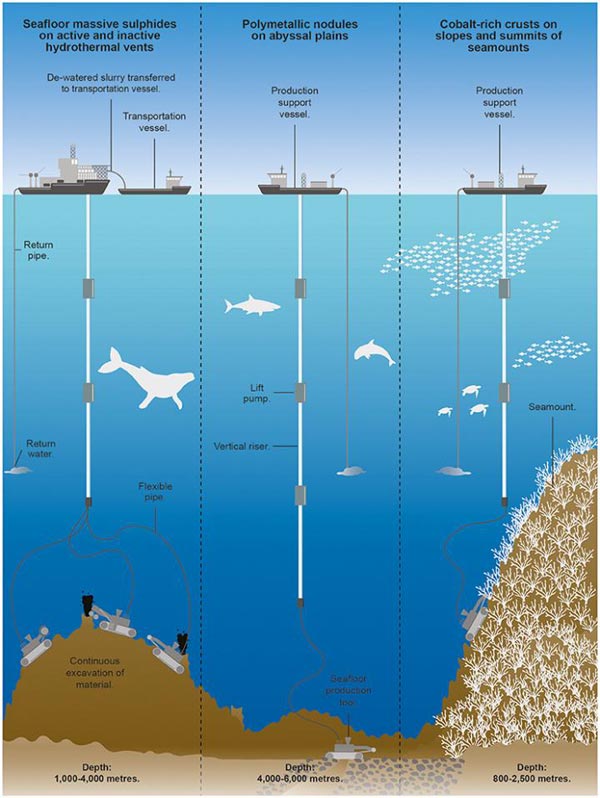Seabed mining could destroy ecosystems

This is a graphic examining the impacts of seabed mining. Credit: Design Studio, University of Exeter Usage Restrictions: This image may only be used with reports of this research
Mining on the ocean floor could do irreversible damage to deep-sea ecosystems, says a new study of seabed mining proposals around the world. The deep sea (depths below 200m) covers about half of the Earth's surface and is home to a vast range of species.
Little is known about these environments, and researchers from the University of Exeter and Greenpeace say mining could have “long-lasting and unforeseen consequences”- not just at mining sites but also across much larger areas.
The study is the first to give a global overview of all current plans to mine the seabed, in both national and international waters, and looks at the potential impacts including physical destruction of seabed habitats, creation of large underwater plumes of sediment and the effects of chemical, noise and light pollution arising from mining operations.
“Our knowledge of these ecosystems is still limited, but we know they're very sensitive,” said Dr David Santillo, a marine biologist and senior Greenpeace scientist based at the University of Exeter. “Recovery from man-made disturbance could take decades, centuries or even millennia, if these ecosystems recover at all.”
“As we learn more about deep sea ecosystems and the role of oceans in mitigating climate change, it seems wise to take precautions to avoid damage that could have long-lasting and unforeseen consequences.”
Despite the term “mining”, much seabed mining would involve extraction of minerals over very wide areas of the sea floor rather than digging down to any great depth, potentially leaving a vast 'footprint' on the deep-sea habitats in which these mineral deposits occur.
Rising demand for minerals and metals, including for use in new technology, has sparked renewed interest in seabed mining.
Some operations are already taking place, generally at relatively shallow depths near national coastlines.
The first commercial enterprise in deeper waters, expected to target mineral-rich sulphides at depths of 1.5-2km off Papua New Guinea, is scheduled to begin early in 2019.
Speaking about these plans last year, Sir David Attenborough said it was “tragic that humanity should just plough on with no regard for the consequences”.
The Exeter and Greenpeace research team say there are “many questions and uncertainties” around seabed mining, including legal issues and the difficulties of predicting the scale and extent of impacts in advance, and of monitoring and regulating mining activity once it takes place in the deep sea. The paper says that alternatives to seabed mining have already been proposed, including substituting metals in short supply for more abundant minerals with similar properties, as well as more effective collection and recycling of components from disused products and wastes.
However, Dr Santillo said demand for seabed mining would also diminish if humanity could cut overproduction and overconsumption of consumer goods. “Rather than using human ingenuity to invent more and more consumer products that we don't actually need, we could deploy it instead to build goods that last longer, are easier to repair and make better use of the limited natural resources we have,” he said.
“With the right approaches, we can avoid the need for seabed mining altogether and stop the 'race to the bottom'.
“As governments prepare to set the rules and the first companies gear up to mine, now is the time to ask whether we just have to accept seabed mining, or should instead decide that the potential damage is just so great that we really need to find less destructive alternatives.”
The paper, published in the journalFrontiers in Marine Science, is entitled: “An overview of seabed mining including the current state of development, environmental impacts, and knowledge gaps.” It is an open-access publication accessible to readers anywhere in the world.
Media Contact
All latest news from the category: Earth Sciences
Earth Sciences (also referred to as Geosciences), which deals with basic issues surrounding our planet, plays a vital role in the area of energy and raw materials supply.
Earth Sciences comprises subjects such as geology, geography, geological informatics, paleontology, mineralogy, petrography, crystallography, geophysics, geodesy, glaciology, cartography, photogrammetry, meteorology and seismology, early-warning systems, earthquake research and polar research.
Newest articles

First-of-its-kind study uses remote sensing to monitor plastic debris in rivers and lakes
Remote sensing creates a cost-effective solution to monitoring plastic pollution. A first-of-its-kind study from researchers at the University of Minnesota Twin Cities shows how remote sensing can help monitor and…

Laser-based artificial neuron mimics nerve cell functions at lightning speed
With a processing speed a billion times faster than nature, chip-based laser neuron could help advance AI tasks such as pattern recognition and sequence prediction. Researchers have developed a laser-based…

Optimising the processing of plastic waste
Just one look in the yellow bin reveals a colourful jumble of different types of plastic. However, the purer and more uniform plastic waste is, the easier it is to…



